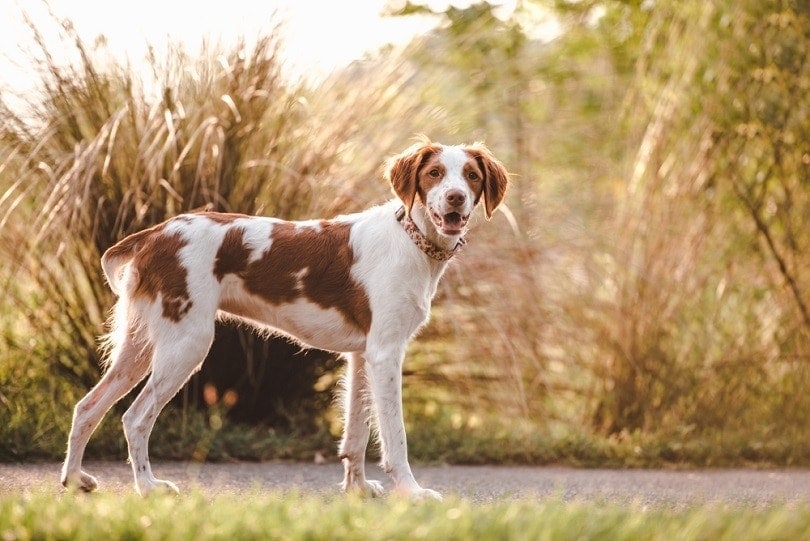16 Bloodhound Pros & Cons: Breed Benefits & Drawbacks

Updated on
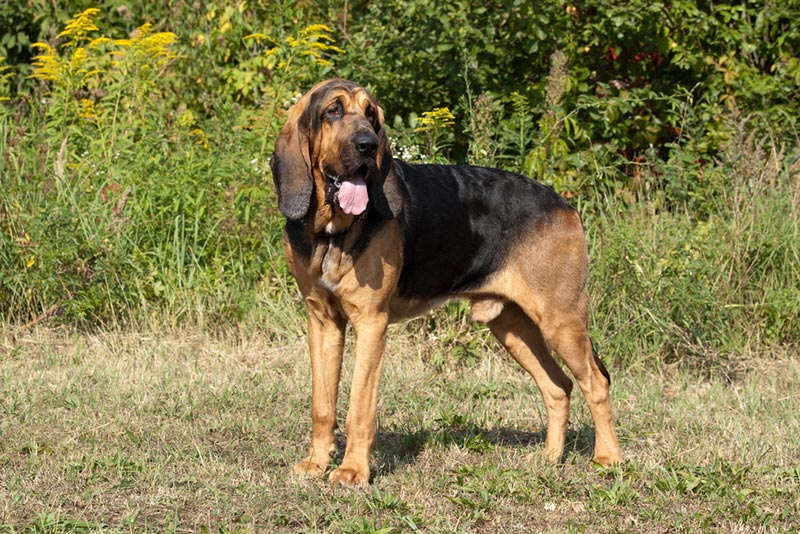
The Bloodhound is a large dog breed from France that features signature long droopy ears, wrinkly skin, short fur, and a hardy build. Unlike the lazy version of the Bloodhound often seen on TV shows like the “Beverly Hillbillies”, this dog has a dignified and noble expression often characterized by wisdom, solemnity, and power.
Bloodhounds are adored by canine enthusiasts because of their unrivaled tracking abilities. They can trail a scent for miles without getting distracted. Unfortunately, these dogs can be overly stubborn, boisterous, and destructive when left to their own devices.
This article will highlight some of the benefits and drawbacks of owning a Bloodhound. Read on to learn if this massive dog breed is a suitable fit for you and your family.
The 8 Benefits of Owning a Bloodhound
1. They Are an Intelligent Breed
The Bloodhounds rank high in the intelligence index with a rating of 4 out of 5 stars.1 They can easily understand and remember commands in 15–25 repetitions. This is perhaps why they are also easy to train. They can easily and quickly make associations between actions and commands.
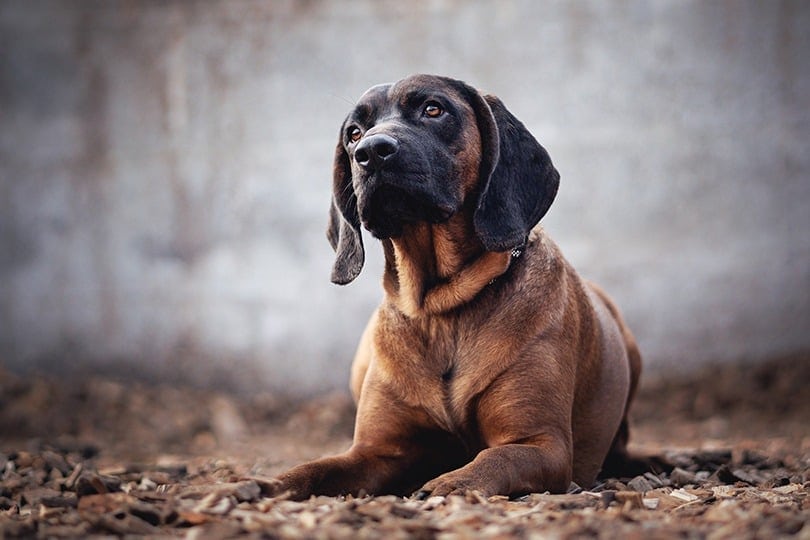
2. They Feature a High Affection Level
Bloodhounds are known to be gentle and affectionate, which makes them more desirable to most people. They are genuinely soft, loyal, and loving toward their handlers and prefer enjoying quality time next to their owners despite what activity they might be engaged in.
These dogs can also recognize their owner’s emotions and respond accordingly because they form very strong bonds. For them, your happiness is their happiness.
3. Low Biting Potential
Despite the negative popular beliefs about Bloodhounds, this breed has a surprisingly low biting potential. Chances are very slim that these dogs can bite someone. However, like most dog breeds, when provoked they can react aggressively. Some of the main reasons this dog might try to bite include excitement, pain, or being provoked.

4. Moderate Shedders
Even though all dogs shed moderately throughout their lives, Bloodhound’s shedding frequency is significantly lower than most dog breeds. However, the shedding frequency will depend on health status, age, and diet.
All in all, they are relatively easier to groom. So, you can easily keep up with grooming at home without relying on a professional groomer. Nevertheless, regular flea treatment is necessary to keep their coat healthy and clean.
5. Are a Great Choice for Service and Therapy Dogs
Bloodhounds can be trained to provide comfort, love, and affection to people in retirement homes, hospitals, nursing homes, disaster areas, and hospices. They also make great companions for people with autism and anxiety disorders.
These dogs also make excellent service dogs. They can be trained to aid people with disabilities such as mobility, hearing and visual impairments, seizures, mental disorders, and diabetes.
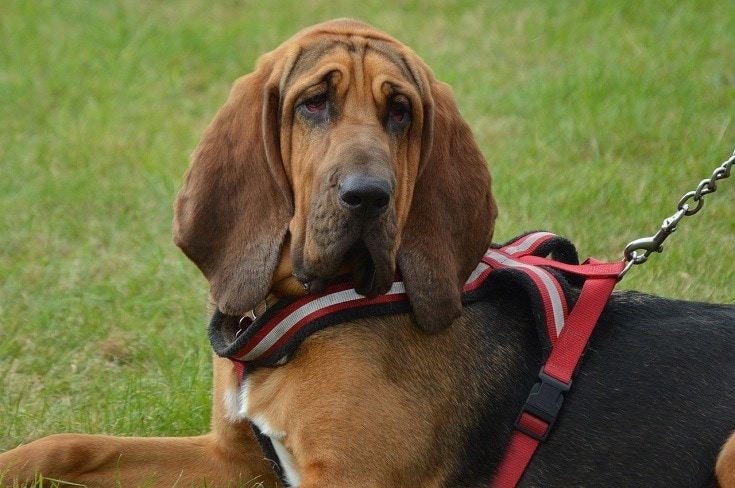
6. They Are Children Friendly
Bloodhounds are suitable family pets because they can get along with all their household members including children. They enjoy playing with the kids or simply being surrounded by them. However, it’s always wise to supervise playtime to prevent potential accidents.
7. Are Cat and Dog Friendly
As earlier mentioned, Bloodhounds can get along with all household members, and this includes other pets such as cats and other dogs. This can be attributed to the fact that they have an average prey drive. Their impulse to chase after and catch small animals is low. This makes them a suitable breed when you want to join dog meet-ups, or you want to add another canine companion to your household.
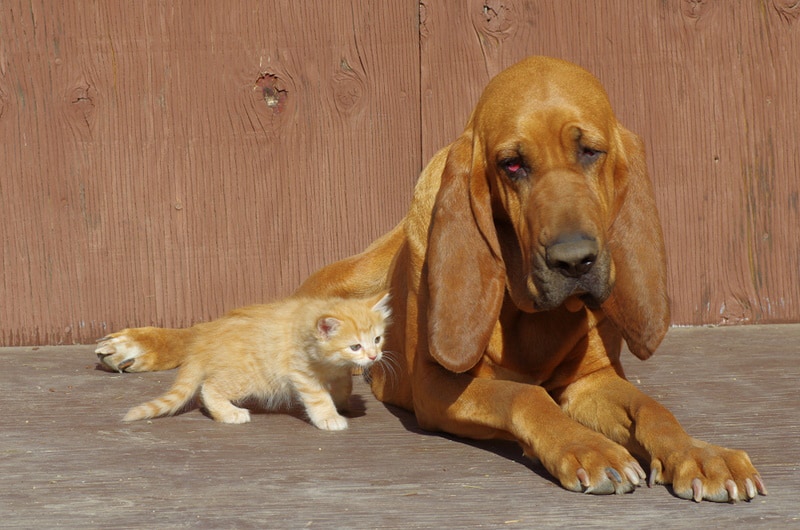
8. Excellent Tracking Companions
Research suggests that Bloodhounds have some of the most developed olfactory senses that you can find in any dog breed. Their keen sense of smell and fierce determination makes them great at tracking a quarry. They are known to track a scent that is even 300 hours old. Moreover, their sense of smell is so strong that evidence gathered by this dog is admissible in a court of law.
They are also commonly used in search and rescue operations and in law enforcement agencies to track down criminals, drugs, and explosives. This is why owners are encouraged to enroll their bloodhounds into the American Bloodhound Club Man-Trailing program.
Their excellent tracking abilities also make them a suitable companion breed for fishermen, hunters, and any family that enjoys spending time outdoors.
- Related Read: How Far Can Bloodhounds Smell? Vet-Approved Breed Facts
The 8 Drawbacks of Owning a Bloodhound
1. High Chances of Inbreeding
As earlier mentioned, Bloodhounds are some of the most popular breeds in America. Due to this popularity, chances of inbreeding are very high. Research points to inbreeding as the main contributor to the cases of health problems and diseases in the breed. So, you should exercise caution when buying a pup, and get one ideally from a professional or an experienced breeder.
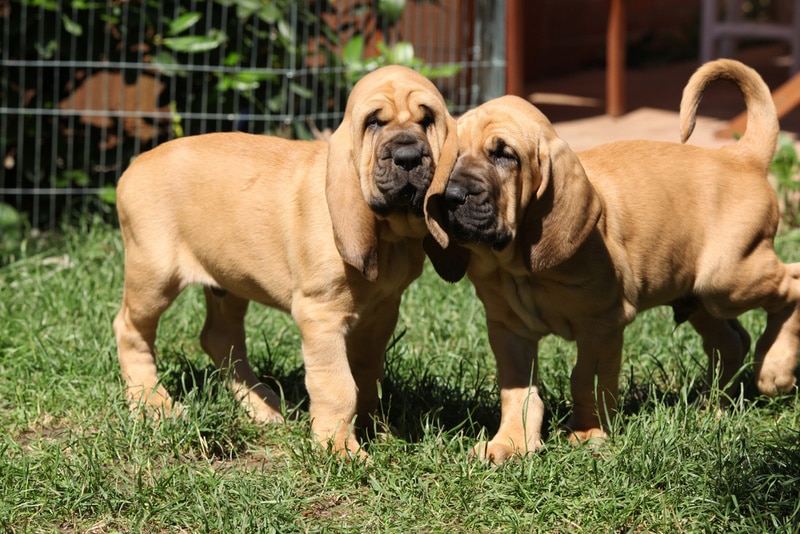
2. They Make Poor Watchdogs
If you are looking to bring a canine into your household to be a guard dog, the Bloodhound might not be a suitable choice. They lack the instincts that would make them protective and territorial about their space. So, chances are very low that your Bloodhound will alert you in the presence of an intruder or if they sense something wrong.
3. More Sensitive Than Most Breeds
A Bloodhound’s sensitivity ranking is higher than in other dog breeds. They tend to be emotionally affected by punishments, whether soft or hard. They are also unable to tolerate noisy households, irregular daily routines, and frequent visitors.

4. They Feature a High Wanderlust Potential
Bloodhounds have a very high ranking when it comes to wanderlust potential. This simply means that they can barely resist the desire to explore the world around them.
So, before bringing the puppy home, make sure you have a dog enclosure, or your yard is fenced. It is also safer to walk this dog while on a leash because they can easily run off to follow an interesting scent. You should also teach your dog to get back to you when commanded.
5. Overly Vocal
Bloodhounds are known to be a notoriously vocal breed, and boy aren’t they loud. They often enjoy howling, whining, and barking loudly at different triggers including alarm, attention, boredom, separation anxiety, defense, greeting, and fear. So, if you want a quiet dog or live in a neighborhood that doesn’t tolerate loud barks, a Bloodhound may not be the best choice.

6. Not Apartment Friendly
While they can live in an apartment, they might not be comfortable enough to thrive. As a large dog breed, Bloodhounds like plenty of space and prefer living in homes with a fenced yard where they can explore and exercise freely. Keeping this breed indoors will only create a host of personality and health problems.
7. Can Smell and Drool a Bit
Bloodhounds are particularly smelly when compared to other dog breeds. Like most scent hounds, Bloodhounds usually emit a musty dog odor usually caused by “gas attacks” due to poor diet or infection in the skin folds, and teeth. The long droopy ears also often catch debris, dirt, and bacteria, thus intensifying the odor that most people find disagreeable.
This breed is also notorious for drooling. But while drooling is normal in dogs like the Bloodhound, it can also be a sign of underlying health issues. So, if your dog changes his drooling habit, consult your local vet.

8. Suffer From Separation Anxiety
If you are considering adding a canine companion into your home, but you travel a lot, a Bloodhound may not be a viable choice. This breed is highly prone to separation anxiety and needs plenty of social interactions to thrive.
This can be attributed to the fact that they form strong lifelong bonds with the owner. If the dog’s parent is away for a significantly long time, the dog might engage in annoying and destructive behavior.
Conclusion
Bloodhounds are a surprisingly gentle and affectionate breed. They form close bonds with their owners and enjoy spending time surrounded by children. However, they can be quite destructive when left alone, and they drool, stink, and bark more than the typical dog. They also have a high potential of digging under or chewing through a fence when exploring.
Before adding a Bloodhound to your home, you need extensive research on the parent breed, breeders, costs, certificates, and overall health. We hope our list of pros and cons will help you determine if this hardy breed is the right companion for you and your family.
See Also:
Featured Image Credit: Vera Zinkova, Shutterstock


